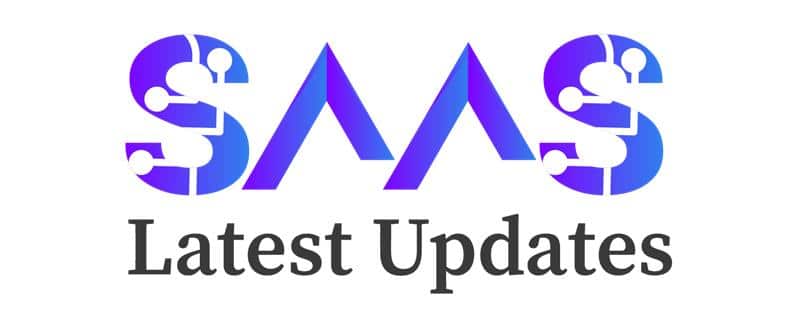A common issue in service-based companies is the lack of efficiency in assigning fieldwork. It is difficult to monitor the location and status of your technicians. It can lead to delayed job completion, which directly impacts customers.
This is where Dynamics 365 CRM field resources come in. These features are the backbone of field service operations. They help companies to assign the right task, equipment, and resources to the right person.
Dynamics 365 also enables a company to get a 360-degree customer view as it brings together customer data, resource availability, and service requests in one place.
In this guide, we’ll discuss what these field resources are, how they provide the best customer experience, types of bookable resources, how to set them up, and the best practices to manage them.
30-Second Summary
When it comes to fieldwork, many companies face multiple issues regarding workers and resources. To streamline these tasks, many businesses are using Dynamics 365 Field Service. This feature has field resources that allow you to assign jobs to ideal people, track their progress, and promptly address any issues.
Read on to learn about the Dynamics 365 CRM field resources feature, optimization of field resources, bookable resources, step-by-step scheduling, and use cases.
What is Dynamics 365 Field Service?
To understand the field resources, we must know what Dynamics 365 is. It is a cloud-based application by Microsoft. It basically provides a vast range of solutions to improve a company’s efficiency and productivity.

This application has two main categories.
- Dynamics 365 Customer Engagement
- Dynamics 365 Finance and Operations
The field resources fall under the customer engagement category. It offers a complete platform for planning, scheduling, and implementing fieldwork.
Benefits of Dynamics 365 Field Service
- It provides improved scheduling and dispatch, so that you can optimize your resources for reduced operational costs.
- It allocates the right resources based on required skills, urgency of the order, and resource availability.
- The self-service portals are organized and provide you with updates and tracking of technicians in real time.
What are Field Resources in Dynamics 365?
In simple terms, field resources are those people, vehicles, equipment, and facilities that carry out work outside the office using Dynamics 365.
For example, the technicians of a telecom company who install internet connections will be considered the field resources.

A logistics company uses drivers and delivery vans to deliver packages. The drivers and delivery vans are the field resources.
A repair service uses field resources, such as employees and specialized tools, to fix machines on-site.
These resources are managed by Dynamics 365. Companies can easily assign work, track the progress of tasks, and update customers in real time.
Optimization of Field Resources
You can achieve optimization of field resources in Dynamics 365 in many ways.
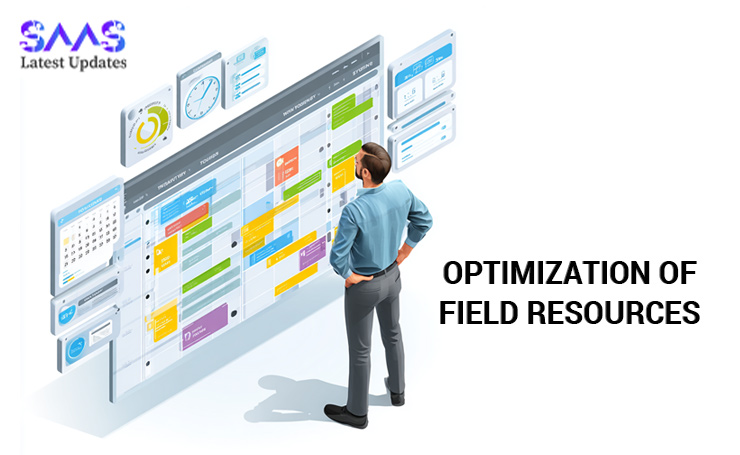
Automatic Task Assignment
This platform uses algorithms that automatically assign jobs to technicians who are nearest and have the maximum equipment. In this way, the travel times get shorter with maximum equipment efficiency.
Location-Based Job Scheduling
This application allows you to schedule jobs based on the location of technicians and customers. It results in shorter distances and increased team efficiency.
Inventory Management
You can manage your inventory and identify any missing parts or tools. It reduces downtime as you can resolve inventory issues promptly.
Real-Time Tracking
You can see the real-time location and status of technicians. It enables you to make proper decisions about the job assignment and helps you minimize downtime.
Integration with other Microsoft Platforms
It is a part of Microsoft Power Platform and integrates seamlessly with other Microsoft solutions, such as Microsoft Power BI and Microsoft Power Automate. This integration allows you to get a complete view of team efficiency and make wise decisions regarding resource allocation.
How Field Resources Deliver a 360-degree Customer View?
A CRM 360-degree customer view means having all the information of your customers in one place. The information can be related to past interactions, service history, preferences, and any ongoing requests.
Field resources can easily achieve this because they directly interact with customers. When resources are properly tracked and managed in Dynamics 365, the following happens.
- Customers get updates about their services on time.
- Businesses can send the most suitable person for the job.
- Managers can easily monitor service delivery and performance.
For instance, if a customer has a history of air conditioner repairs, Dynamics 365 will schedule the technician who has expertise in this field. It will result in a quicker service with a high customer satisfaction rate.
Dynamics 365 Field Service Bookable Resources
In Dynamics 365 field service, bookable resources are essential to the scheduling and task management system. These are people, vehicles, equipment, and facilities assigned for jobs from the organization.
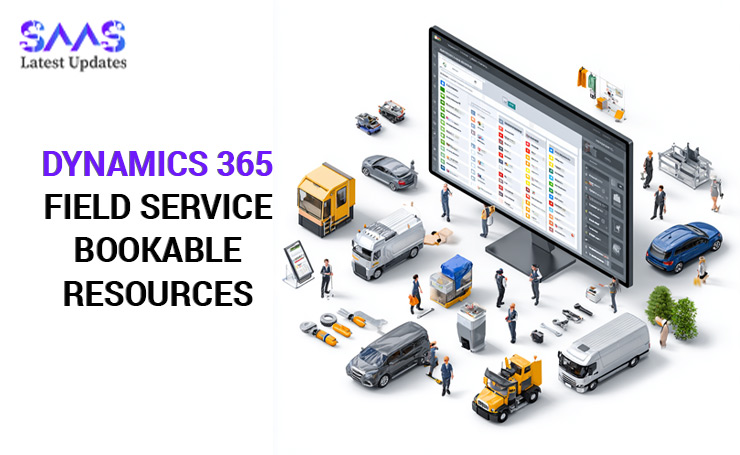
Dynamics 365 provides a broader approach when it comes to resources. It recognizes that many tasks in the service field are handled by both human and non-human resources and schedules accordingly.
Dynamics 365 Resource Scheduling
This platform requires a resource to have certain qualifications and experience when scheduling a job. For example, if a customer wants to install a security camera of a specific brand, the resource should be a certified camera installer and have experience in installing cameras from that specific company.
Let’s see how it works step-by-step.
Define the Job Requirements
Every job has certain requirements, whether it is a work order, service activity, or custom schedulable entity. These requirements include specific skills or certifications, geographic territories, and roles.
Match Resources to the Requirements
The system checks available resources to see which one fits the best according to the job requirements. It looks at the skills and proficiency level. It considers roles and categories to find relevant people. It also looks at the territories to assign work to the person who is available in the right location.
Optimize Scheduling with Proficiency Models
Proficiency models in Dynamics 365 allow organizations to set levels of expertise, such as Beginner, Intermediate, and Expert. When a job comes, this model chooses the right resources with the required proficiency level.

Assign the Best Resource
Once the potential resources are chosen, the dispatcher and system can assign tasks in two ways. The first one is manually assigning the task to the suitable match. The second way is using Resource Scheduling Optimization (RSO), which considers time, distance, priorities, and workload.
Track and Update Schedule in Real Time
Resources get the notification on their mobile device once the work is assigned. Updates like job completion, reassignments, and delays are shown in the system, so the schedule remains accurate at all times.
Scheduling Capabilities
Resource scheduling is one of the most powerful features of Dynamics 365.
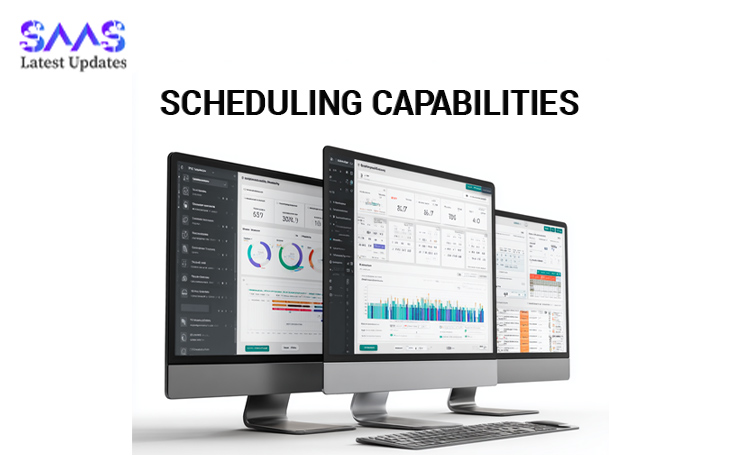
The capabilities of this feature are
Manual Scheduling: Managers can easily drag-and-drop resources into jobs on the Schedule Board.
Automated Scheduling: The system automatically assigns the job to the right person depending on its characteristics.
AI-assisted Scheduling: With the Resource Scheduling Optimization add-on, AI evaluates multiple factors to choose the ideal resource for the job.
Route Optimization: The jobs are assigned to the resources that are in the same region as the customer, consequently saving travel time and fuel costs.
Real-time Adjustments: If a resource suddenly becomes unavailable or a customer reschedules, the manager can adjust assignments using the drag-and-drop features.
Dynamics 365 Bookable Resource Types
The types of bookable resources are below.
User: These are the internal staff members of an organization, such as healthcare workers, technicians, engineers, and delivery drivers. They have clear working hours, skill sets, and areas where they will be working.
Contact: These are the external freelancers or contractors who are not a part of the company but still provide services.
Account: These are the partner organizations that undertake specific tasks.
Equipment: These are all the physical tools, machinery, and vehicles that are scheduled with humans.
Facility: These are warehouses, depots, or service centers where activities take place.
Dynamics 365 Resource Characteristics
Dynamics 365 CRM field resources are defined by different characteristics. These characteristics are basically any unique skills, qualifications, or certifications a resource has.

For instance:
- A technician can have an “Electrical Certification.”
- A driver can have a “Heavy Vehicle License.”
- A doctor might have a specialization in “Cardiology.”
These characteristics are helpful for managers, as they can assign the person the right task. They also reduce the chances of mismatching and increase customer trust.
Field Service Resource Attributes Dynamics 365
Attributes in Dynamics 365 are slightly different than characteristics. Characteristics (as we discussed above) are skills, certifications, and qualifications. On the other hand, attributes are more like factual data points used to filter or match resources.
In other words, attributes tell about the specific details of a resource, such as
- Work hours
- Availability
- Geographic location
- Cost per hour or per job
- Role
For example, a technician’s characteristic will be the holder of “Electrical Certification” and the attribute will be “available from Monday to Friday in New York from 9 AM to 5 PM.”
How to Set Up Bookable Resources in Dynamics 365
Here is how you can set up bookable resources in Dynamics 365.
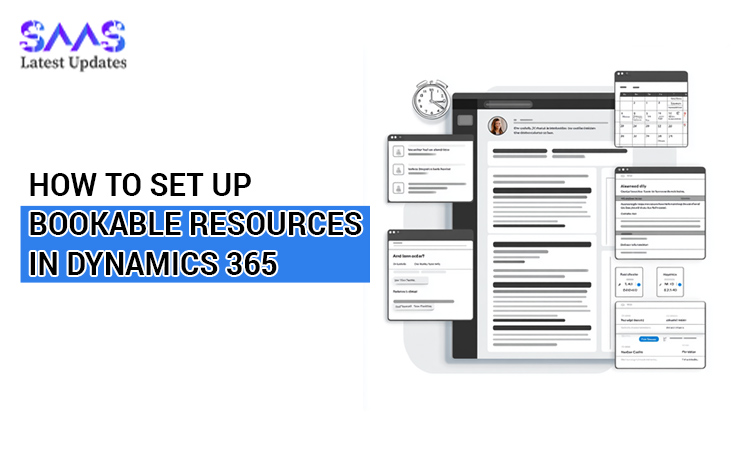
Navigate to the Resource Settings: Go to the “Field Service option” in Dynamics 365 and select “Resources” from the menu.
Add a New Resource: Click on “New” to create a bookable resource. You can choose the right type of resources from the categories.
Fill in Resource Details: Add name, time zone, availability, and calendar settings. For humans, add their work hours, and for machines, add when they are available for booking.
Define Resource Characteristics: Add skills, certifications, and qualifications, so that the application can assign suitable tasks.
Set Work Hours: Add work shifts and holidays in the Resource Calendar. It ensures that scheduling is realistic and prevents overbooking for a single resource.
Enable Resource for Scheduling: Now, you can mark that the resource is active and available for booking. It will show in the “Schedule Board”, and dispatchers can assign jobs to them.
Accessing Field Resources through the Mobile App
Dynamics 365 CRM field resources are easily accessible through the Field Service mobile app. This app is particularly useful for managers, technicians, and other workers, as it enables them to stay connected throughout, regardless of their location.

Users get access to data that is available on their desktops. It means that resources can view work orders, schedules, customer details, and other information on their mobile or tablet without needing to go back to the office.
Viewing Assigned Resources and Tasks
Technicians can see their daily schedule and what resources are allocated to them, including tools and vehicles. It reduces any confusion and makes technicians prepared for their next tasks.
Updating Resource Utilization in Real-Time
Technicians can easily mark their work progress directly in the mobile app. For example, they can mark job completion, flag any issues, and report how many resources are used. Moreover, managers and dispatchers can see these updates, resulting in effective communication.
Offline Access to Resources
Offline capabilities are particularly important when the internet has limited connectivity. Field workers can easily view all the critical details, such as work orders and resources. The updates get automatically synced when the internet connects.

Improved Customer Experience
This mobile app provides technicians with instant access to customer and resource information. Using it, field workers can provide accurate services. For instance, if a tool is missing, the worker can check other inventories or request reassignment.
Enhanced Productivity
The mobile app reduces the manual paperwork and constant communication about every little detail. All resource information is at the fingertips of workers, and they can focus on their jobs effectively.
Use Cases of Dynamics 365 CRM Field Resources
Below are the industries that benefit the most from using Field Resources management in Dynamics 365.

- Telecom and Utilities: You can assign technicians to repairs and installation
- Healthcare: You can schedule home visits for medical professionals
- Manufacturing: You can easily send repair teams for on-site maintenance
- Delivery and Logistics: You can manage drivers and delivery vehicles.
Best Practices for Managing Field Resources in Dynamics 365
- Keep the information about your resources updated all the time.
- Utilize automated scheduling to reduce workload and errors.
- Train your staff to use the mobile app for real-time updates.
- Review customer feedback and performance metrics of your resources.
- Analyze the data to avoid overlooking a single resource.
Conclusion
If your business relies on field workers, you should invest in the Dynamics 365 CRM field resources feature. It is the best way to bring structure, visibility, and efficiency to fieldwork operations.
Moreover, by using a 360-degree customer view, managers make sure that every job is completed on time for customer satisfaction.
Interested in more SaaS related information? Feel free to explore the Latest SaaS Updates.
FAQs
What are Field Resources in Dynamics 365 CRM?
Field resources in Dynamics 365 are the people, equipment, facilities, and contractors that undertake jobs outside the office. For example, technicians, delivery drivers, vehicles, and tools are considered resources in the CRM.
What is the Difference between Field Resources and Bookable Resources in Dynamics 365?
Field resources is a general term for all resources, such as people, tools, contractors, etc. In contrast, the term bookable resources is used for resources that are available for a job.
What are the Types of Field Resources in Dynamics 365?
The main types of field resources are user, contact, account, equipment, and facility.
Is there a Difference Between Field Resources Attributes and Characteristics?
Yes, there is a slight difference. An attribute of a resource describes work hours, availability, and area. The characteristics explain any skills and certifications.
How does Dynamics 365 Resource Scheduling help Organizations?
Resource scheduling in Dynamics 365 enables companies to assign fieldwork to the best resource. The scheduling capabilities include manual, AI-driven, and automated scheduling.
